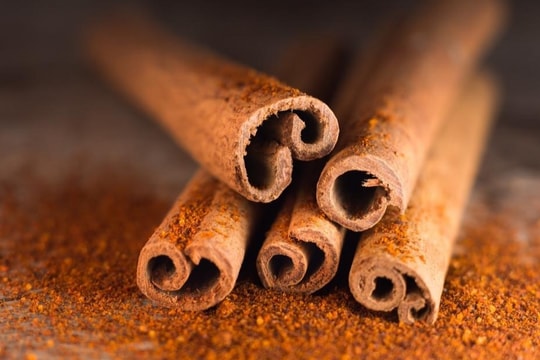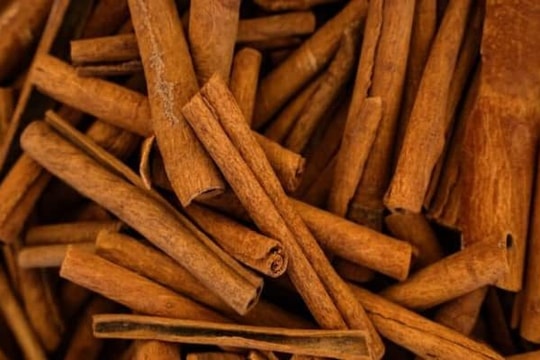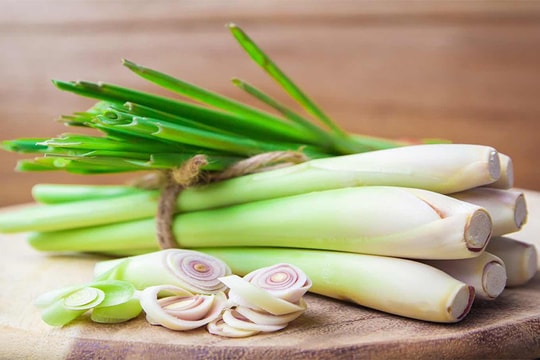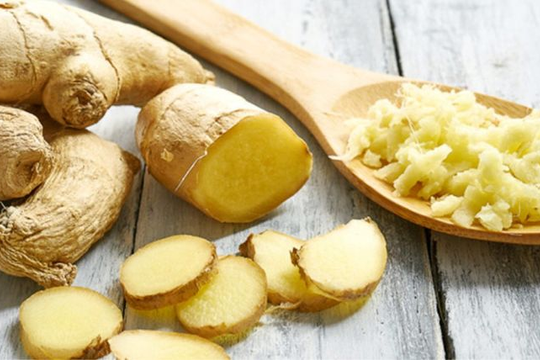Do spices expire and when should you throw them away?
Dried herbs and spices can last 1-4 years, but it depends on the spice and how it is prepared and stored. In general, spices will lose their aroma and flavor over time.
Many popular spices and herbs, such as cloves, turmeric, rosemary, sage, and cinnamon, have demonstrated powerful antioxidant and anti-inflammatory properties.
Dr. Truong Hong Son, Director of the Vietnam Institute of Applied Medicine, said that most herbs contain nutrients that are good for health such as iron, calcium, magnesium, niacin, riboflavin, vitamins A, C, phosphorus, zinc, pyridoxine, copper, and manganese. Thanks to these ingredients, herbs can help improve health and help the body fight disease.
Many studies have shown that consuming herbs can improve cognitive function. Aromatic herbs also help improve memory and fight serious brain diseases including Alzheimer's.
Using parsley and some other herbs can help kill cancer cells. Parsley contains very high amounts of Apigenin, which can reduce the chances of cancer cells and tumors developing in the human body.
In addition, Apigenin may also help prevent the formation of new blood vessels. This prevents the growth of cancer cells.
According to Dr. Son, basil is especially good for cardiovascular patients. Basil contains powerful anti-inflammatory and antioxidant substances that can support the treatment of various diseases and complications of cardiovascular disease.
Many studies have shown that consuming herbs can reduce pain including arthritis. In addition, herbs also help treat arthritis, aching limbs, etc.
They are also commonly used to relieve pain. For example, in China, peppermint is used to treat menstrual cramps and improve stomach pain.
Here are 10 health benefits of herbs:
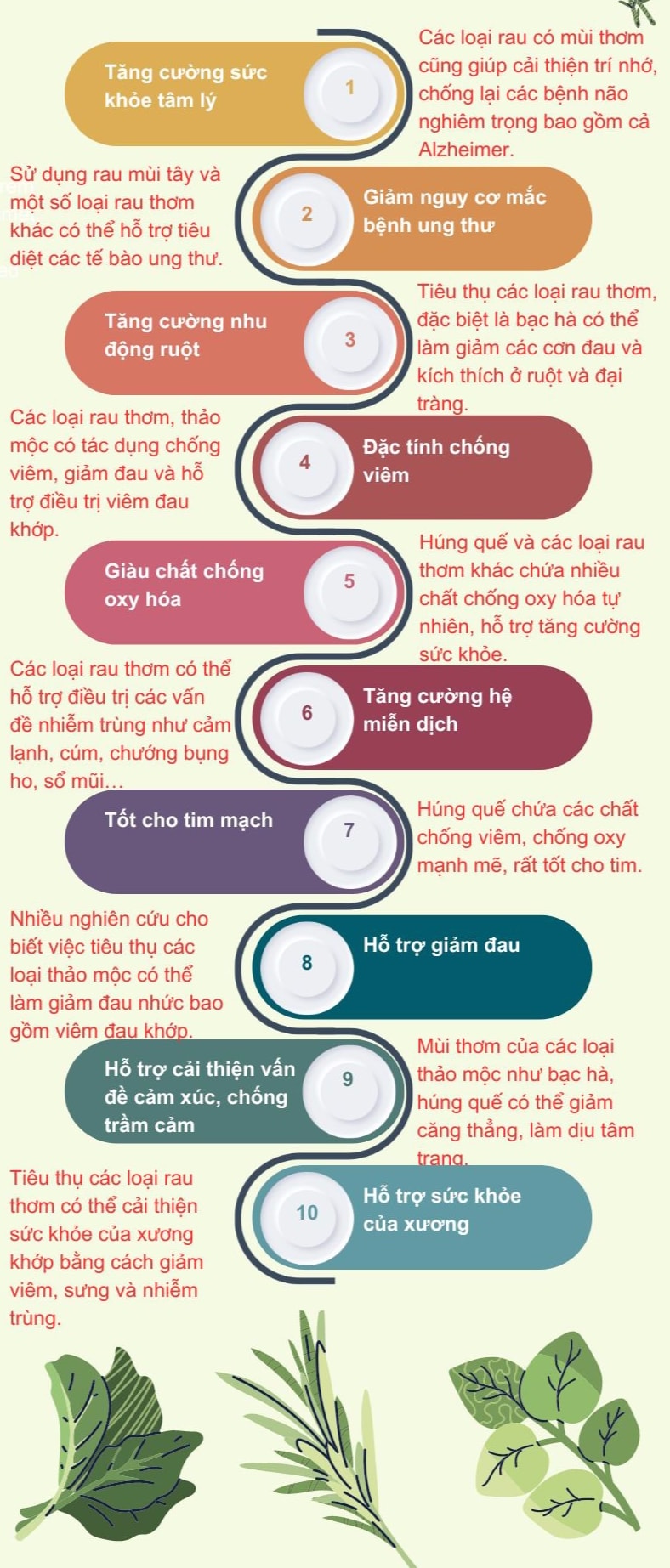
Shelf life of common herbs and spices
If you've been collecting herbs and spices for a while, you may wonder if they expire and when you should throw them away.
In the culinary world, spices are made from the dried roots, bark, or stems of plants, while herbs are the dried or fresh leaves of plants.
According toHealthlineWhen determining the shelf life of dried herbs and spices, factors to consider include the type, preparation, and storage. For example, dried spices tend to last longer than dried herbs, and the more whole the spice—or the less processed it is—the longer its shelf life.
Dried herbs typically last 1-3 years. Examples include basil, oregano, thyme, dill, parsley, cilantro, mint…
Ground or powdered spices typically have a shelf life of 2-3 years. These include ground ginger, garlic powder, ground cinnamon, chili powder, turmeric, ground pepper, etc.
Whole or unground spices have the longest shelf life because their surface area is exposed to air, light, and moisture. This allows them to retain their aromatic oils and flavor compounds longer than ground spices.
If stored properly, whole spices can last up to four years. Examples include peppercorns, coriander, mustard seeds, fennel seeds, nutmeg, cloves, cinnamon, whole dried chilies, lemongrass, etc.
Salt is the exception to this rule, as it can be used indefinitely regardless of its size and shape without spoiling or losing flavor.
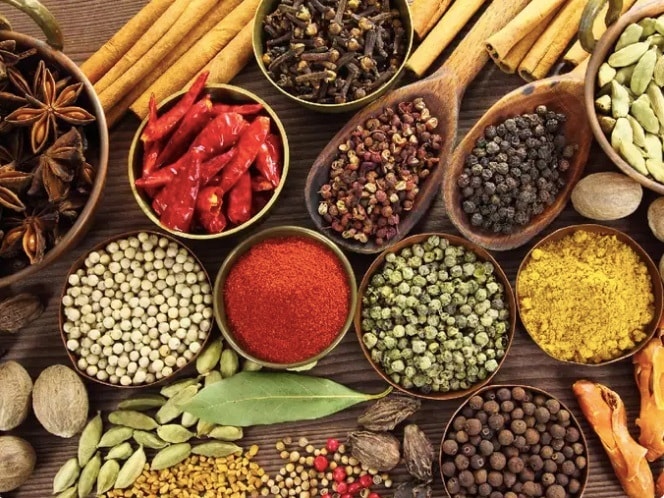
If stored properly, spices can last up to four years. Photo: Times of India
How do you know if your spices have gone bad?
Dried herbs and spices don't actually expire or go bad in the traditional sense. When a spice is said to have gone bad, it simply means that it has lost much of its flavor, potency, and color. Fortunately, consuming a spice that has gone bad won't make you sick.
Many store-bought spices list a best-by date, which indicates the time frame in which they will retain their most potent flavor and quality.
It is generally safe to consume dried herbs and spices that are past their best before date, although they will not impart as much flavor as fresh herbs and spices.
If you're not sure how long your spices have been around, you can tell if they're time to toss by checking their scent and flavor. Crush or rub a small amount in your palm. If the scent is weak and the flavor is bland, it's probably a good time to replace them.
Store spices for maximum shelf life
Minimizing their exposure to air, heat, light and moisture is key to maximizing the shelf life of herbs and spices.
While storing spices in clear containers next to the stove may be convenient and aesthetically pleasing, it’s not a great way to store them. Instead, a cool, dry, dark environment like a pantry, drawer, or cabinet located away from the stove or oven is a great place to store your spice collection.
You will also want to make sure that your spices are stored in airtight containers. Glass or ceramic containers are some of the best options as they are easy to clean and do a great job of keeping out air and moisture.
Plastic containers are also a popular option, but they are often not airtight and can absorb the colors and odors of different spices, which can make them more difficult to clean if you want to reuse them.
Although red spices like paprika and cayenne pepper don't need to be refrigerated, they'll retain their color longer if they're refrigerated. Similarly, keeping spices that contain oils, like sesame seeds, in the refrigerator can help prevent them from going rancid.
Also, remember that moisture can quickly degrade the flavor and texture of spices, potentially causing them to become cakey or moldy. If you notice mold in any of your spice containers, throw that product out.
You can keep spices dry by spooning them out of the container before adding them to hot steaming food instead of sprinkling them straight from the container./.

